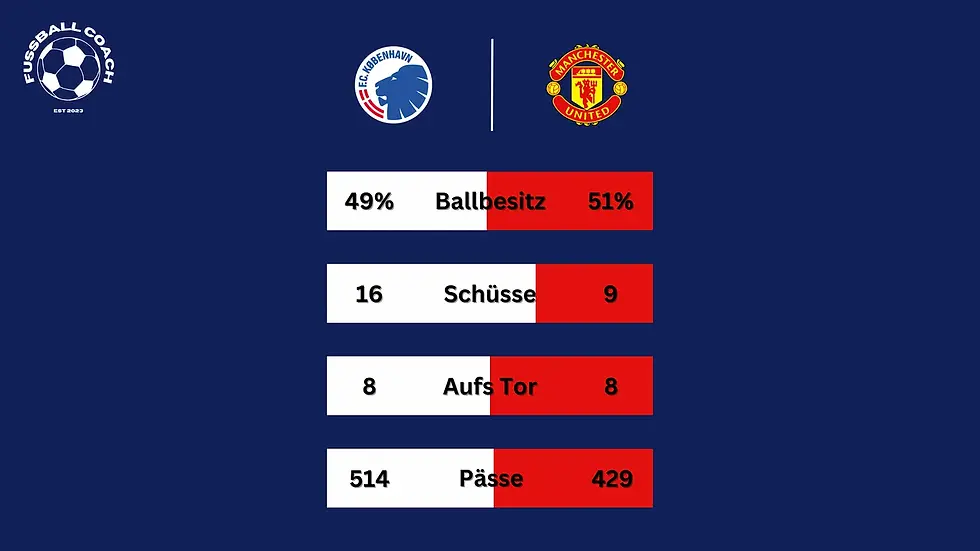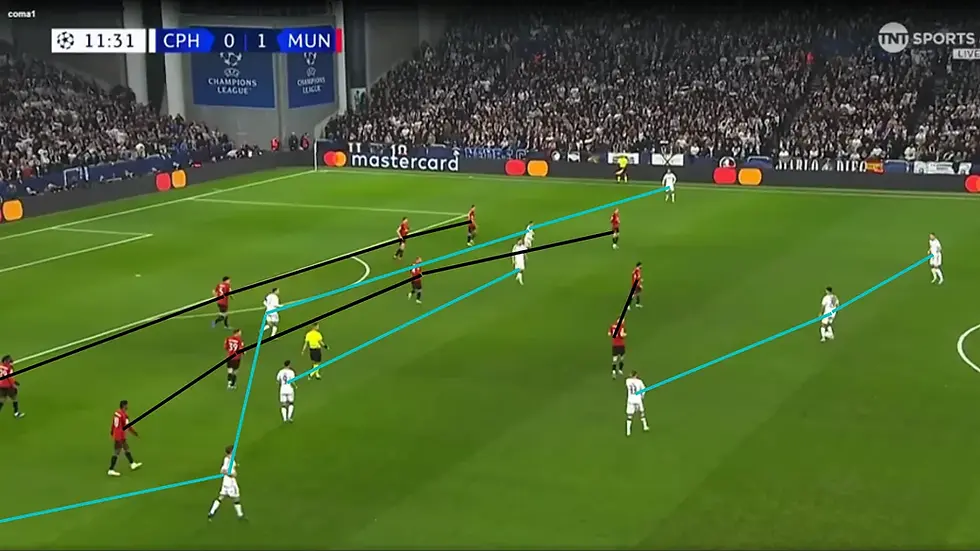Copenhagen triumphs over the Red Devils.
Hello and a warm welcome to the latest edition of our newsletter! In this issue, the following topics are in focus:
⚽ Copenhagen vs Manchester United - Game Analysis
📖 Playbook Corner Kicks
➡️ Weekend To-Do List
✒️ Quote of the Week
⚽ Copenhagen vs Manchester United - Game Analysis
Manchester United had to concede a 4-3 defeat in Copenhagen, despite holding the lead twice. Let's take a closer look at this thrilling game.
First, let's delve into the statistics:

Additional interesting facts about the game:
Roony Bardghji (17y 358d) was the youngest player to score against Manchester United in the UEFA Champions League.
Manchester United lost a UEFA Champions League match in which they led by 2+ goals for the very first time.
Højlund has scored five goals in the competition in four appearances, the quickest any player has ever done so for the Red Devils.
Jonny Evans made his first UEFA Champions League appearance for Manchester United since December 2013 v Shakhtar, nine years and 333 days ago. The only player to have a longer gap between games played for the same English club in the competition is Cristiano Ronaldo, also for Man Utd (12y 110d).
The lineups of both teams:

Manchester United started the game extremely promisingly, maintaining a significant amount of possession from the outset. In their own half (Zone 1), they consistently held numerical superiority by playing with six outfield players and the skillful goalkeeper (Onana) against the four players of Copenhagen. Initially, Copenhagen adopted a more defensive approach and struggled to pose a significant threat to Manchester United.

Copenhagen also acted in the build-up play in their own half similarly or even the same as Manchester United. However, the crucial difference was that Manchester, with one player more compared to Copenhagen, applied pressure, making it more challenging for them to build up the game from the back.

This led to the Red Devils successfully combining after an unsuccessful pressing attempt by Copenhagen, scoring the 1-0 in the 3rd minute.
If both teams managed to combine their way into the second playing field zone, they demonstrated a similar approach in both offensive and defensive aspects. In attack, both teams predominantly positioned themselves in a 3-2-5 formation, while defensively, they often defended in a 4-4-2 setup.


In the 28th minute, the Red Devils succeeded in scoring the 2-0 through an effective counter-attack. They dominated the game clearly in all phases and even had opportunities to score the 3-0, likely securing the game definitively. However, in football, they say that a 2-0 lead is the most dangerous result. Most teams tend to withdraw slightly, attempting to calm the game down and manage it securely. As a result, Copenhagen gradually found more opportunities to combine and entered Manchester United's half more frequently, which was less common in the first 30 minutes.
In the 42nd minute, Rashford received a direct red card and had to leave the field. This was a pivotal moment in the game because only 3 minutes later, Copenhagen scored the 2-1. The conceded goal happened exactly on the side that Rashford had previously occupied and now had to be taken over by Bruno Fernandes. In this action, Fernandes didn't cover his teammate tightly enough, resulting in a long ball being played into the middle, allowing Elyounoussi to score with a direct shot.

Now, the Copenhagen team was back in the game, having the momentum on their side, especially in their home stadium, where a very good atmosphere prevailed. And so, what one ideally wants to avoid in football happened: a goal just before halftime. It even got worse, and in injury time of the first half, Goncalves scored the 2-2 through a handball penalty, which was also the halftime score.
The second half:
Manchester United prepared for an extremely challenging second half with only 10 players. In the second half, Ten Hag brought on Amrabat for Eriksen to gain more defensive stability after the red card. Surprisingly, it was once again the Red Devils who made a promising start and took the initiative, even though they were at a numerical disadvantage. It remains unclear whether this was a deliberate tactical decision by the Copenhagen coach or if the respect for Manchester United, despite the numerical disadvantage, was still too significant.

Over time, Copenhagen gained confidence and became more dangerous. They managed to consistently push the Red Devils further into their own half and eventually took control of the game.

Then, surprisingly and against the run of play, Manchester United took the lead again through a handball penalty. Nevertheless, Copenhagen had enough time for a counter-reaction. With nothing to lose and in desperate need of a goal, they increased their pressure, pushing Manchester deep into their own half. It was evident that it would be a battle for the Red Devils. And so, in the 83rd minute, a precise cross led to the equalizer of 3-3. The stadium was roaring, and there was still enough time to score an additional goal and win the crucial match.
Indeed, Copenhagen managed to take the lead in the 87th minute. The goal scorer, Roony Bardghji, a 17-year-old talent from their own academy. Manchester had only a few minutes left to equalize and went all-in. They attacked with all available players and even had a dangerous shot hitting the crossbar from Maguire. However, that was the last opportunity, and a spectacular game came to its conclusion.
Conclusion:
In the role of a coach, you can meticulously plan and analyze everything, but certain dynamics are unpredictable. The red card for Rashford is an example of how the entire previous plan can become obsolete. Such events cannot be pre-planned, and that's what makes sports so special. It's not always logical and depends on so many factors that a coach can only influence to a limited extent or not at all. Manchester United actually showed a solid performance, but the mentioned red card completely altered the dynamics of the game. In this regard, the statement of the Copenhagen coach after the match was also interesting:
"Of course, the red card changed the dynamics of the game. As a Copenhagen coach, I consider it our weakest performance in this group stage so far. So, if you assess today's match, perhaps we didn't deserve three points, or maybe even one. However, looking at the overall performance over four rounds, it is very well deserved that Copenhagen is in second place. I truly believe that we are the second-best team over these four games."
📖Corner Kick Playbook
Football is a multifaceted sport. Even in seemingly simple situations like a corner kick, there are countless paths to success. It's impossible to list all conceivable corner kick variations. However, understanding the tactical strategies you can employ during corner kicks is crucial.
Get the free PDF file and explore how Premier League teams scored their goals from corner kicks in the past season. The 44-page file provides theory, statistics, and 13 practical examples.

➡️Weekend To-Do List
Listen / Watch: High Performance podcast episode featuring Edwin Van Der Sar as a guest. Edwin Van Der Sar: My Last Interview As Ajax CEO
✒️Quote of the Week
Tottenham manager Ange Postecoglou responds to a journalist's question about why his team defended so high despite being two players down.
"It is just who we are mate, it is who we are and who we will be for as long as I am here."
.png)
Comments